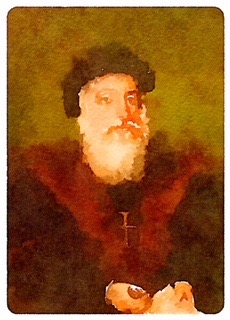
Portuguese navigator Vasco da Gama, 1st Count of Vidigueira (c.1469-24 December 1524) was the first European to sail around the Cape of Good Hope to Asia,
His initial voyage to India (1497–1499) set the stage for an age of global imperialism, laid the foundations for the long-standing Portuguese colonial empire in Asia. It was the longest sea voyage made up to that time, covering a distance greater than the Earth's circumference as measured around the Equator.
Da Gama was born in Sines on the coast of Alentejo province in southwestern Portugal, the third son of a minor provincial nobleman who was the local alcaide-mór (civil governor).
Little is known of his early life, but he was probably educated in the inland town of Évora, studying mathematics, navigation and nautical science and went on to become a naval officer. He is reputed to have distinguished himself when he was sent to the port of Setúbal and the Algarve to seize French ships in retaliation for French depredations against Portuguese shipping.
His success on that mission may explain Manuel I's decision to give him the command of the expedition to follow up on Bartolomeu Dias' possible route to India around the Cape of Good Hope. The reasons behind the decision are not clear-cut. Da Gama was relatively young and inexperienced, and may not have been the original choice. He may have inherited a commission intended for his father, who died before work on the ships was complete, or for his brother, Paulo, who had issues with his health but eventually agreed to command the expedition 's second carrack, the São Rafael.